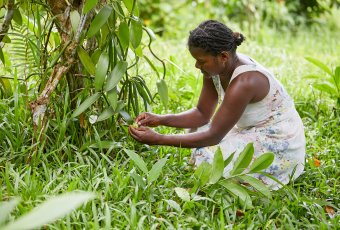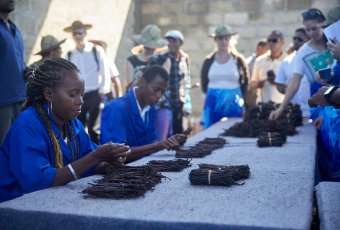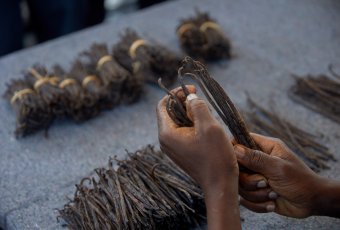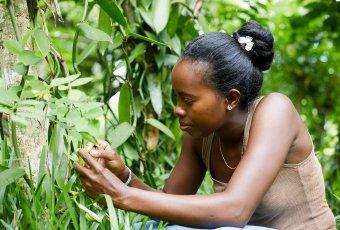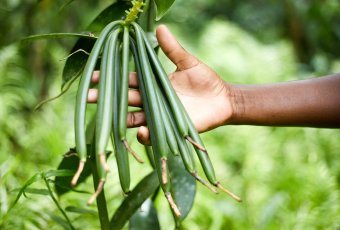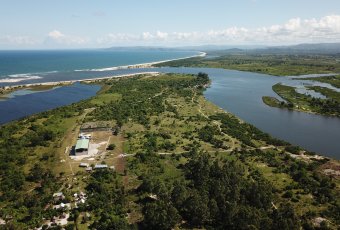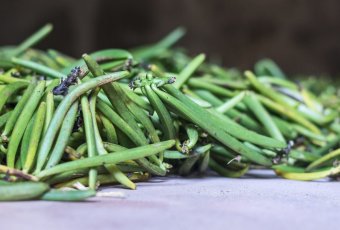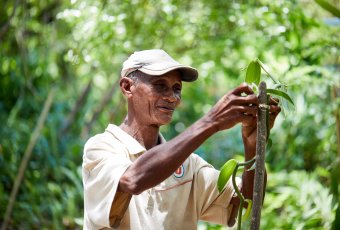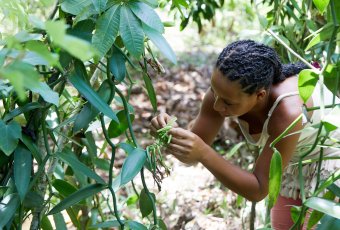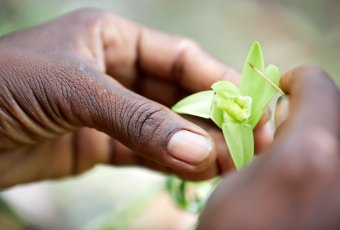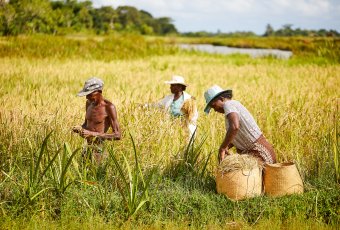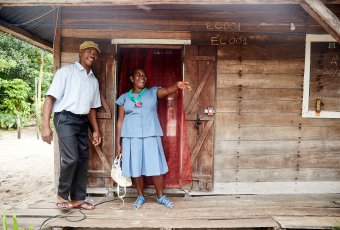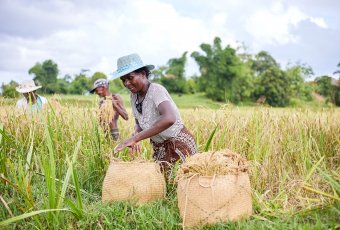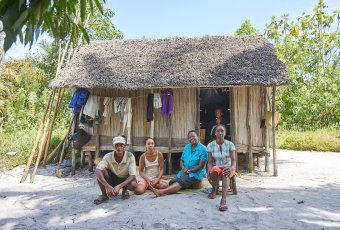The context
Vanilla is a vital ingredient that is widely used in many industries, including food, cosmetics, and perfume. 80% of global vanilla production is concentrated in a small area in the North of Madagascar, one of the poorest countries in the world. Over the past decade, vanilla farmers and industry leaders have been confronted with a difficult situation.
On the one hand, vanilla farmers are in a poverty trap – they lack efficient practices and finance to grow high quality vanilla, nor can they plan ahead to sell cured vanilla. As a result, the farmers get a low price for poor quality vanilla, reinforcing the poverty cycle. On the other hand, vanilla prices have been subject to massive theft and severe volatility due to a lack of cash flow pushing farmers into harvesting their vanilla too early, leading to poor quality in the market. Supply shortages of quality vanilla also cause speculation and increase the risk of theft from farmers. Moreover, extreme weather events, most recently cyclone Enawo in March 2017, can decimate the vanilla crop and add further stress to an already fragile system.
The project
The Livelihoods Fund for Family Farming, an impact investment fund created by Danone, Firmenich, Mars and Veolia to foster sustainability and poverty reduction in supply chains, is investing in a large-scale vanilla project with an innovative model where farmers and industry players share both benefits and risks. This project, with 3,000 family farms, aims to tackle not only quality and traceable vanilla production but also food security for farmers and biodiversity conservation. Prova, a supplier to Mars, is a partner in the project. It is implemented It has been implemented since 2017 by Fanamby, a Madagascan NGO with extensive experience working with vanilla producers, Missouri Botanical Garden, a biodiversity conservation NGO and Maisons Familiales Rurales, an educational association.
All partners in the Livelihoods-Vanilla project have committed to the project over a 10-year span. The Livelihoods Fund for Family Farming and the French Development Agency bears the upfront financial risk by providing funding to the NGO for implementing the project and monitoring related to sustainable vanilla production and biodiversity conservation.
The social, environmental, and economic impacts
The project is located outside the Sava region where vanilla production is currently concentrated. The area has been selected as it offers lots of potential for vanilla production. The program aims to train farmers over five years on sustainable practices to increase vanilla productivity and quality through agroforestry techniques. A newly created farmer-owned cooperative, structured with Fanamby’s support, will seek to connect producers more directly to markets, and will collect the vanilla, cure[1] it and export it to the project partners.
Moreover, the project seeks to protect a unique tropical forest and a wealth of biodiversity thanks to the vanilla buffer zone generating significant income disincentivize local communities to deforest, putting in place a community based governance gathering active members managing conservation activities and applied biodiversity protection laws, community patrol and planting native windbreakers and firewall tree species preventing natural disasters to affect the protected area.
It plans to offer farmers alternative economic opportunities, such as clove production and poultry farming, to preserve local forests from illegal logging and slash-and-burn practices.
[1] Once green vanilla beans have been harvested, they undergo a curing process, to become cured beans sold at market. Green vanilla beans are sorted and graded, cleaned, immersed in hot water and dried to reveal their aroma. About six months are required for these different steps and around 6-7 kilos of green vanilla are needed to get 1 kilo of cured vanilla. The quality of vanilla relies on the quality and maturity of green beans and the precision and rigor of the curing process.
Our Partners
- AFD
- FFEM
- Danone
- Mars Incorporated
- Firmenich
- Prova
- NGO Fanamby
- NGO Missouri Botanical Garden
- Association Maisons Familiales Rurales
Learn more:
- https://www.livelihoods.eu/transforming-the-relationship-between-smallholder-famers-companies-an-example-with-the-livelihoods-vanilla-project/
- https://www.livelihoods.eu/press-release-livelihoods-fund-invests-in-vanilla-in-madagascar/
- https://www.livelihoods.eu/vanilla-from-field-to-market-patience-precision/ https://www.livelihoods.eu/an-ngo-a-private-company-share-their-views-on-the-livelihoods-vanilla-project-in-madagascar/



